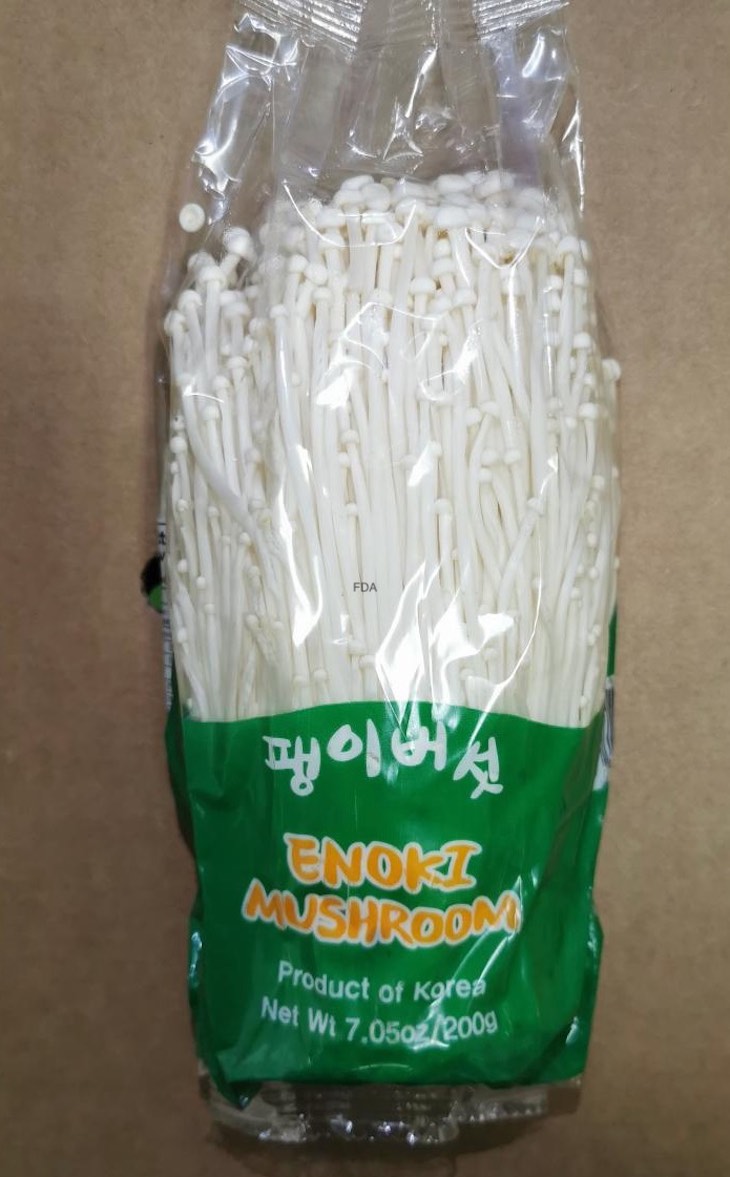At least 36 people are sick in an enoki mushroom Listeria monocytogenes outbreak linked to product imported from Korea. The mushrooms were imported by Sun Hong Foods. The mushrooms were just recalled after a sample tested positive for Listeria monocytogenes by the Michigan Department of Agriculture and Rural Development. There is zero tolerance for Listeria monocytogenes contamination in ready to eat foods in this country.

These enoki mushrooms were sold in 7.05 ounce clear plastic packaging, with UPC number 7 426852 625810. These mushrooms are also known as enokitake, golden needle, futu, or lily mushrooms. The mushrooms were sold to these retailers: J&L Supermarket, Jusgo Supermarket, ZTao Market, New Sang Supermarket, and Galleria Market in these states: California, Florida, Illinois, Oregon, and Texas.
The case count by state is: Arizona (2), California (9), Florida (2), Hawaii (3), Indiana (1), Kentucky (1), Massachusetts (2), Maryland (2) Michigan (1), Missouri (1), North Carolina (1), New Jersey (1), Nevada (1), New York (4), Rhode Island (1), Tennessee (1), and Virginia (3). Thirty patients have been hospitalized because they are so sick, and four people have died. Illness onset dates range from November 23, 2016 through December 13, 2019. This long range is common in many listeriosis outbreaks.
State and local officials interviewed patients about the foods they ate the month before they got sick. Twelve out of 22 patients said they ate mushrooms, including enoki, portobello, white, button, cremini, wood ear, maitake, and oyster before they got sick. And the Listeria monocytogenes bacteria found in the Sun Hong Foods enoki mushrooms is a genetic match to the outbreak strain under whole genome sequencing.

You can contact food safety lawyer Fred Pritzker, who has represented many clients in Listeria monocytogenes food poisoning cases, for help by calling 1-888-377-8900 or 612-338-0202.
Noted food safety attorney Fred Pritzker said, “These types of outbreaks are just devastating. Four people have died and 30 others have been hospitalized because a ready-to-eat food was contaminated with this pathogen. Companies must do a better job of tracking and eliminating this pathogen wherever it is found.”
The FDA notice states that consumers who are in high risk groups for serious food poisoning complications, including the elderly, pregnant women, young children, people with chronic illnesses, and anyone with a compromised immune system shouldn’t eat any mushrooms imported from Korea even if they aren’t part of the Sun Hong Foods recall.
Consumers should not eat and restaurants sold not sell these recalled enoki mushrooms. Check your refrigerator to see if you have this product. If you aren’t sure where the mushrooms you have came from, throw them away as well. If you do have these mushrooms, throw them away, then clean your refrigerator with a mild bleach solution to kill any remaining pathogens. Wash your hands thoroughly with soap and water after handling these mushrooms and after cleaning.
The symptoms of listeriosis can take up to 70 days to appear; this bacteria just has a long incubation time. Symptoms include high fever, stiff neck, severe headache, muscle aches, and diarrhea. Pregnant women can suffer miscarriage, stillbirth, and premature labor if they contract this infection, even though their illness seems mild. If you have eaten enoki mushrooms from Korea and have been sick, see your doctor and tell her about this outbreak. You may be part of this enoki mushrooms Listeria monocytogenes outbreak.




